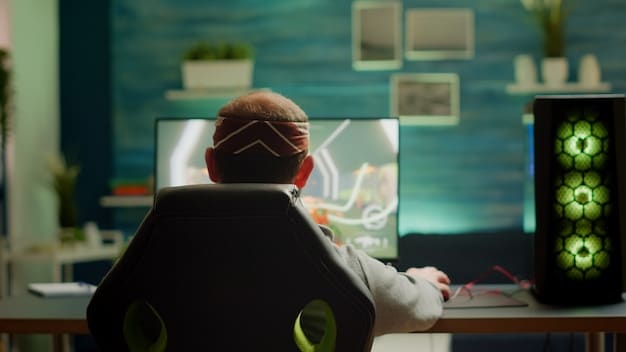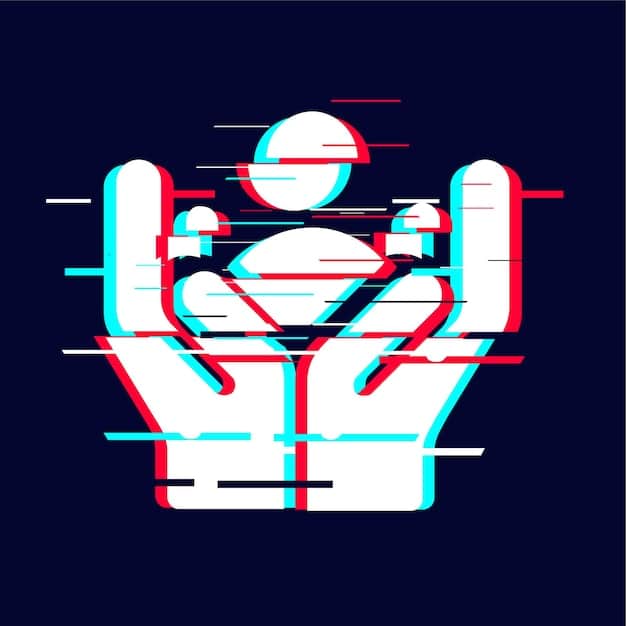Modding PC Games: Legal Boundaries & Best Practices for US Gamers

Modding PC games in the US involves navigating intellectual property laws and terms of service, with best practices emphasizing community guidelines, non-commercial use, and respect for developer intent to ensure legal compliance and avoid potential issues.
For many PC gamers in the US, the ability to modify, or “mod,” their favorite titles offers an unparalleled sense of customization and extends gameplay far beyond its original design. However, delving into the world of modding PC games: legal boundaries and best practices for US gamers requires a nuanced understanding of various factors, from intellectual property rights to potential risks, ensuring a safe and compliant experience for all participants.
understanding the legal landscape of modding
The legal framework surrounding PC game modding in the United States is complex, primarily revolving around intellectual property law, specifically copyright. When a game developer creates a game, they inherently own the copyright to its code, assets, and overall design. Modding, by its very nature, involves altering or creating derivative works based on this copyrighted material. This is where the intricacies begin. Generally, creating a mod without the explicit permission of the copyright holder could technically be considered copyright infringement. However, the practical application of this law in the modding community is often more lenient, particularly when mods are non-commercial and do not directly compete with or devalue the original product. The concept of “fair use” sometimes enters the discussion, but its application to modding is tenuous and highly dependent on specific circumstances, rarely providing a clear-cut defense in court.
copyright and intellectual property
Copyright is the primary legal mechanism protecting game developers. It grants them exclusive rights to reproduce, distribute, perform, and display their creative works. When a modder alters game files, they are technically creating a “derivative work.”
* Derivative Works: Any new work based on one or more pre-existing works. For mods, this typically means altering game code, textures, or adding new content.
* Exclusive Rights: Developers have the sole right to authorize such modifications. Without this authorization, a mod can be seen as an infringement.
* DMCA: The Digital Millennium Copyright Act (DMCA) can be invoked by developers to issue takedown notices for infringing content, including mods, especially if they distribute copyrighted assets or circumvent DRM.
terms of service (TOS) and end-user license agreements (EULA)
Beyond federal law, the most direct legal boundaries for modding are set by the game developers themselves through their Terms of Service (TOS) and End-User License Agreements (EULA). These are contracts that players agree to, often implicitly, when they purchase and install a game. These agreements frequently contain clauses that restrict or prohibit modifications to the game.
* Developer Control: TOS/EULAs give developers significant control over how their games are used, including prohibiting reverse engineering, modification, or distribution of altered game files.
* Account Bans: Violating these terms can lead to consequences ranging from the mod being shut down to the player’s account being permanently banned, particularly in online multiplayer games where mods can confer an unfair advantage.
* Variations: It’s crucial to acknowledge that TOS and EULAs vary widely between developers and games. Some developers are highly permissive; others are strictly prohibitive. Always review the specific game’s agreements.
The legal landscape is less about direct prosecution of individual modders for non-commercial, single-player mods and more about the developers retaining the right to control their IP. Most developers tolerate, and sometimes even encourage, modding when it enhances their game’s longevity and community engagement, provided it doesn’t cross into piracy, cheating, or direct competition. However, this tolerance can vanish quickly if a mod causes issues like security vulnerabilities, unfair gameplay advantages in competitive environments, or infringes heavily on copyrighted material in a commercial way. Understanding these nuances is key to navigating the modding scene responsibly. Ignoring them can lead to unforeseen consequences, from community backlash to legal actions, though the latter is considerably rare for non-commercial modding endeavors.
developer stances on modding: a spectrum of support
The relationship between game developers and the modding community is incredibly diverse, ranging from outright prohibitions to active encouragement and collaboration. This spectrum is shaped by various factors, including the game’s genre, its business model, and the developer’s philosophy regarding community involvement and content creation. Understanding a developer’s specific stance is paramount for any modder looking to work within legal and ethical boundaries. Some developers view mods as a powerful tool for extending the lifespan of their games, fostering creativity, and maintaining a vibrant player base, while others see them as a potential source of instability, security vulnerabilities, or intellectual property infringement.

open-ended support and tools
On one end of the spectrum are developers who actively support and facilitate modding. These studios often release official Software Development Kits (SDKs) or modding tools, provide dedicated workshop platforms (like Steam Workshop), and sometimes even host official modding forums or communities.
* SDKs and APIs: Releasing SDKs or Application Programming Interfaces (APIs) allows modders to work with the game’s engine and assets in a structured and supported manner, reducing the likelihood of breaking the game or violating terms.
* Official Workhops: Platforms like Steam Workshop streamline the process of finding, installing, and managing mods, often incorporating developer-approved guidelines. This simplifies access for players and provides a controlled environment for modders.
* Community Engagement: Developers may directly engage with modders, offer feedback, and sometimes even hire talented modders to work on official expansions or future titles. This creates a symbiotic relationship.
A prime example is Bethesda Game Studios, creators of “The Elder Scrolls” and “Fallout” series. Their games are legendary for their robust modding scenes, largely due to the developers’ consistent release of Creation Kits and their integration with Steam Workshop. This approach has significantly increased the longevity and appeal of their titles.
cautious approval or limited support
Many developers fall into a middle ground, neither actively endorsing nor strictly prohibiting modding. They might tolerate certain types of mods, particularly those for single-player experiences that don’t affect game balance or online integrity. However, they typically offer no official tools or support, leaving modders to reverse-engineer or rely on community-developed utilities.
* Unofficial Modding: Modders in this scenario often rely on community knowledge and tools, which can be less stable or more prone to breaking with game updates.
* Focus on Online Integrity: For games with a strong multiplayer component, developers are usually much stricter about mods that could confer an unfair advantage, leading to anti-cheat measures and potential bans.
* Silent Approach: Some developers simply remain silent on the issue, implicitly allowing modding as long as it doesn’t generate negative press or legal issues. This passive stance can create uncertainty for modders.
strict prohibition and enforcement
At the other end are developers who strictly prohibit modding. This is especially common in competitive online games where fairness and preventing cheating are paramount, or in games with complex anti-tampering software (DRM). Violating these restrictions can lead to severe consequences.
* Anti-Cheat Systems: Many online games employ sophisticated anti-cheat systems that can detect unauthorized modifications, leading to immediate bans.
* DRM: Digital Rights Management (DRM) technologies are designed to prevent unauthorized copying and alteration of software, which can inadvertently or intentionally block modding.
* Legal Action: While rare for non-commercial modders, if a mod is seen as directly hurting the developer’s revenue (e.g., bypassing microtransactions) or facilitating piracy, legal action is a possibility.
Understanding these different developer attitudes is crucial. A mod that is perfectly acceptable for one game could lead to an account ban in another. Always research the specific game and developer’s policies before attempting to create or use mods. Rely on official sources, community wikis, and reputable modding forums to gauge the prevailing developer stance and community best practices.
best practices for u.s. gamers: ethical and safe modding
Navigating the world of PC game modding, especially in the US, extends beyond just understanding legal boundaries; it also encompasses adopting ethical considerations and safe practices. A considerate approach ensures not only personal legal safety but also contributes positively to the broader modding community and respects the efforts of game developers. These practices revolve around respecting intellectual property, maintaining game integrity, understanding potential risks, and engaging responsibly within the community. Prioritizing these aspects helps foster a healthy modding ecosystem beneficial for both players and creators, minimizing friction and maximizing creative potential. It’s about being a good citizen in the digital realm of gaming.
respecting intellectual property and developer intent
The cornerstone of ethical modding is respect for the original creators. This means understanding that while you might alter a game, the underlying intellectual property (IP) still belongs to the developer.
* Non-Commercial Use: Always strive for non-commercial use. Do not try to sell mods that incorporate copyrighted game assets or code. Monetizing mods is a significant legal risk and often violates EULAs.
* Original Assets vs. Replacement: Creating original assets that *replace* existing game assets is generally safer than directly redistributing copyrighted game files. For instance, making a new texture is typically less risky than packaging the game’s original textures with your mod.
* Attribution: If you use assets or code from other modders, always give proper attribution. This fosters goodwill and respects the efforts of fellow creators.
* No Piracy or DRM Bypassing: Never create or use mods that facilitate piracy, crack DRM, or bypass in-game monetization systems. These activities are illegal and will incur the wrath of developers and publishers.
understanding and mitigating risks
Modding, while rewarding, carries certain risks. Being aware of these and taking steps to mitigate them is a crucial best practice.
* Game Instability: Mods can introduce bugs, crashes, or conflicts with other mods. Always back up your game files and saves before installing new mods.
* Security Risks: Download mods only from reputable sources. Malicious actors can hide malware, viruses, or spyware within mod files. Use antivirus software and exercise caution.
* Account Bans: As discussed, using unauthorized mods in online games can lead to account suspensions or permanent bans. Always check a game’s policy on mods before using them in multiplayer.
* Compatibility Issues: Game updates can frequently break mods. Be prepared for your mods to become incompatible and require updates from their creators.
community engagement and responsible sharing
The modding community thrives on collaboration and shared knowledge. Engaging responsibly is vital for its health and growth.
* Vetting Sources: When downloading mods, stick to well-known and trusted modding websites (e.g., Nexus Mods, ModDB) and official developer workshops. Check comments, reviews, and user endorsements.
* Testing and Feedback: If you are a mod creator, thoroughly test your mods before releasing them. Provide clear installation instructions and be open to feedback from users.
* Reporting Issues: If you encounter a problematic mod, report it to the platform administrators or the mod author, rather than silently risking potential issues for others.
* Support the Developers: Ultimately, modding relies on the existence of the original game. Support developers by purchasing their games, DLCs, and official merchandise. A thriving game means a thriving modding scene.
By adhering to these best practices, US gamers can enjoy the vast creative potential of modding while minimizing legal risks and contributing positively to a vibrant and respectful gaming community. It’s about striking a balance between freedom to customize and responsibility towards creators and fellow players. Always prioritize safety, ethics, and respect to ensure a sustainable and enjoyable modding experience.
modding and competitive multiplayer games: a perilous intersection
The intersection of modding and competitive multiplayer games is often fraught with tension, leading to some of the most stringent restrictions imposed by game developers. While modding can enhance single-player experiences, its application in competitive online environments raises immediate concerns about fairness, balance, and the integrity of the game. Developers invest heavily in creating level playing fields, and any modification that confers an unintended advantage or alters the core gameplay mechanics can directly undermine this effort. Consequently, the legal and practical boundaries for modding in these contexts are far more rigid, necessitating extreme caution from players.
fairness and anti-cheat systems
The primary concern in competitive multiplayer is maintaining fairness. Mods that give players an unfair advantage, often referred to as “cheats” or “hacks,” directly violate this principle.
* Unfair Advantages: This includes aimbots (auto-aim), wallhacks (seeing through walls), speed hacks, or any mod that provides information or capabilities not available to all players.
* Anti-Cheat Detection: Developers deploy sophisticated anti-cheat systems (e.g., VAC, Easy Anti-Cheat, BattlEye) designed to detect unauthorized modifications to game files or memory.
* Consequences: Detection almost always results in a permanent ban from the game, severing access to the player’s account and all associated purchases. These bans are often irreversible.
Even seemingly innocuous visual mods can sometimes trigger anti-cheat systems if they alter core game files in unexpected ways. It’s not always about the mod’s intent, but its technical impact on the game’s integrity.
official resources and sanctioned modifications
Some competitive games might allow very specific, developer-sanctioned modifications, but these are rare and highly controlled.
* Cosmetic Only: If mods are allowed, they are typically limited to purely cosmetic changes (e.g., custom skins) that have no impact on gameplay or balance. These are often distributed through official channels or modding tools.
* Developer Approval: Any mod for a competitive game would need explicit, public developer approval, generally communicated through official patch notes or community guidelines.
* Esports Integrity: For games with a strong esports presence, rules around modifications are exceptionally strict, often prohibiting any form of client-side alteration to maintain the competitive integrity of professional play.
community perception and responsibility
Beyond official enforcement, using unauthorized mods in competitive games carries significant social repercussions within the gaming community.
* Reputation: Players caught cheating or using unfair mods are quickly ostracized and lose their standing within the community.
* Damage to Game: Such mods can erode trust, diminish the fun for legitimate players, and ultimately harm the game’s community and longevity.
* Personal Responsibility: Players have a responsibility to uphold the spirit of fair play. If a mod potentially offers an advantage, it is best to avoid it in competitive settings.
In conclusion, for competitive multiplayer games, the best practice is to assume that any form of unauthorized modification is prohibited and will likely lead to an account ban. Unless a mod is explicitly supported and distributed through official channels by the game developer, it introduces an unacceptable risk of violating the terms of service and facing severe penalties. The integrity of competitive play outweighs the individual’s desire for customization in these scenarios, making the intersection one that demands extreme caution and adherence to developer rules.
the evolution of modding: from grass-roots to cultivated ecosystems
The landscape of PC game modding has undergone a transformative evolution over the decades, transitioning from largely grassroots, ad-hoc efforts to increasingly cultivated and sometimes even officially sanctioned ecosystems. This shift reflects both the growing sophistication of game development and a recognition by developers of the immense value that a thriving modding community can bring. What began as a subversive act of altering game files has often matured into a collaborative process, fostering creativity, extending game lifespans, and, in some cases, even influencing future game design. Understanding this evolution helps contextualize current best practices and the varying legal stances.
early days: hacking and independent creation
In the early days of PC gaming, modding was primarily a technical endeavor, requiring a significant amount of reverse engineering and programming knowledge.
* Unsanctioned Efforts: These mods were rarely supported by developers and often involved direct manipulation of game binaries or assets. Tools were typically community-developed or rudimentary.
* Focus on Utility: Early mods often aimed to fix bugs, improve performance, or add minor quality-of-life features, in addition to novel content.
* Distribution Challenges: Sharing mods was cumbersome, often relying on small, independent websites, forums, or peer-to-peer methods. This made quality control and safety checks difficult.
Games like “Doom” and “Quake” were pioneers in demonstrating the power of grassroots modding, leading to countless custom maps, skins, and game modes that significantly extended their replayability.
the rise of official tools and platforms
As developers recognized the value of modding, many began to actively support it by providing official tools and established platforms for distribution.
* SDKs and Creation Kits: The release of Software Development Kits (SDKs) and dedicated creation kits (e.g., Bethesda’s Creation Kit) democratized modding, making it accessible to a wider audience without deep programming knowledge.
* Integrated Workshops: Platforms like Steam Workshop revolutionized mod distribution, offering centralized hubs for discovery, installation, and rating. This standardization improved safety and ease of use.
* Curated Content: Some developers or platforms allow for curation, featuring high-quality or official mods, further legitimizing the practice.
This phase saw a massive expansion in the number and complexity of mods, as barriers to entry lowered and distribution became more streamlined.
commercialization and community professionalization
More recently, modding has seen tentative steps towards commercialization and a degree of professionalization, blurring lines between fan creation and official content.
* Developer-Sponsored Mod Programs: A few developers have experimented with paid modding initiatives (e.g., Bethesda’s Creation Club), aiming to compensate modders. While controversial, these highlight a desire to integrate modding into a commercial framework.
* Modders to Developers: It’s increasingly common for successful modders to be hired by game studios, bringing their expertise and creativity directly into the industry.
* Community Professionalization: Many modding teams now operate with a degree of professionalism, with project managers, dedicated artists, and programmers, often working on highly ambitious total conversion mods.
This evolution signifies a growing maturity in the relationship between developers and modders. While legal boundaries remain, the trend suggests a move towards more integrated and officially recognized modding ecosystems, where creativity is fostered alongside adherence to sensible guidelines. For US gamers, this means an increasingly diverse and accessible modding scene, provided they continue to respect the evolving legal frameworks and best practices. The future of modding seems to lean towards more collaborative models, where developers and players collectively shape the ongoing life of a game.
the risks and rewards of total conversion mods
Total conversion mods represent some of the most ambitious and transformative projects within the modding community. Unlike smaller modifications that alter specific aspects of a game, total conversions aim to overhaul the original game almost entirely, creating a new experience often set in a different world, with new mechanics, stories, and assets. While these mods offer immense creative freedom and can breathe new life into older titles, they also navigate the most challenging legal and technical terrains, presenting unique risks and significant rewards for both creators and players. Their ambition often pushes the boundaries of engine capabilities and intellectual property law.
unparalleled creative freedom and community impact
The primary reward of total conversion mods lies in their capacity for profound creative expression and their impact on the gaming community.
* New Game Experiences: They can effectively create an entirely new game using an existing engine, offering a fresh narrative, genre, or world within a familiar technical framework.
* Extending Game Lifespan: Total conversions can significantly extend the longevity of a game, attracting new players and rekindling interest in older titles long after their commercial lifespan.
* Showcasing Talent: For modders, creating a total conversion is an immense undertaking that serves as a powerful portfolio piece, showcasing their skills in design, programming, art, and storytelling.
* Community Collaboration: These projects often involve large teams of volunteers, fostering strong community bonds and collaborative development, sometimes mimicking commercial game studio environments.
Iconic examples include “Black Mesa,” a total conversion of “Half-Life” in the “Half-Life 2” engine, and “Nehrim: At Fate’s Edge,” a total conversion for “Oblivion,” both demonstrating the incredible potential for fan-made content.
heightened legal and technical risks
Despite their creative potential, total conversion mods carry the highest legal and technical risks due to their comprehensive nature.
* Intellectual Property Exposure: Because total conversions often replace a vast majority of the original game’s content, the risk of inadvertently using copyrighted material (e.g., music, sound effects, or even game mechanics too closely resembling a different IP) is higher.
* Dependency on Original IP: Most total conversions still rely on the original game’s engine and some underlying code. This means they are still derivative works; full legal independence is rare. Developers retain rights to the engine and its components.
* Distribution Challenges: Distributing a total conversion often requires users to own the base game. Modders must be meticulous in ensuring their distribution methods do not facilitate piracy by including copyrighted game files.
* Stability and Compatibility: Overhauling an entire game introduces a multitude of potential bugs, crashes, and compatibility issues. Maintaining stability across different hardware configurations is a monumental task.
* Development Time and Burnout: Total conversions are akin to developing an indie game, requiring thousands of hours of volunteer work. Burnout and projects failing to reach completion are common risks.
For US gamers and modders considering total conversions, the best practice is to be acutely aware of these risks. Creators must be scrupulous in ensuring all new assets are original or properly licensed, and that the mod is distributed in a way that respects the original game’s intellectual property. For players, understanding that these projects are often labors of love with inherent technical challenges means exercising patience and being prepared for bugs. The rewards, however, of experiencing a truly new game born from a community’s passion often outweigh the complexities, making total conversions a fascinating and enduring part of the modding landscape.
the future of modding: integration, monetization, and AI’s role
The trajectory of PC game modding appears set for further integration, with developers increasingly recognizing its value. This evolution will likely bring new avenues for monetization, as well as the profound, albeit complex, influence of artificial intelligence. The future of modding hints at a more structured and perhaps more financially viable ecosystem, moving beyond purely amateur endeavors, while simultaneously grappling with the ethical and creative implications of emerging technologies. The lines between official content and community creations may continue to blur, presenting both opportunities and challenges for the industry and modders alike.
increased developer integration
Developers are likely to deepen their engagement with modding, moving beyond simple tool releases to more active collaboration.
* Official Modding Initiatives: We may see more structured programs akin to Bethesda’s Creation Club, but perhaps with improved community feedback and fairer compensation models.
* Modding APIs and Frameworks: Future game engines might be designed from the ground up with moddability as a core principle, offering more robust and flexible APIs for content creation.
* Community-Driven Content Expansion: Developers could increasingly rely on modding communities to test new features or even generate official content, potentially compensating contributors for high-quality additions.
This integration could lead to a more stable environment for modders, with better tools and financial incentives, fostering professional growth within the hobby.
monetization debates and ethical considerations
The concept of monetizing mods remains contentious but is unlikely to disappear. Future discussions will focus on fair payment models and ethical implications.
* Subscription Models: Some platforms might explore subscription-based access to curated mod content, providing a steady revenue stream for mod creators.
* Direct Donations & Patreon: Existing models like Patreon and direct donations will likely continue to grow, allowing players to directly support their favorite modders outside of formal developer ecosystems.
* Ethical Guidelines for Paid Mods: As monetization becomes more common, clearer ethical guidelines will be necessary regarding asset ownership, fair compensation, and transparency with users. This includes ensuring that mods are not pay-to-win, especially in any competitive context.
The challenge will be to balance modders’ desire for compensation with the community’s expectation of free content and the developers’ intellectual property rights.
the advent of artificial intelligence in modding
AI’s rapidly expanding capabilities are poised to significantly impact modding, offering both transformative potential and new complexities.
* AI-Generated Assets: AI tools could revolutionize asset creation, allowing modders to generate textures, 3D models, or even voice lines more quickly and efficiently. This could lower the barrier to entry for complex mods.
* AI-Powered Content Generation: Procedural content generation through AI could create vast new worlds, quests, or dynamic NPCs, vastly expanding the scope of what individual modders can achieve.
* Automated Mod Management: AI could assist in conflict detection, load order optimization, and even self-repairing broken mods, making the modding experience smoother for users.
* Ethical Challenges: The use of AI in modding also raises ethical questions regarding intellectual property of AI-generated content (especially if trained on copyrighted data without permission), the displacement of human artists, and the potential for AI-generated “junk” content.
Ultimately, the future of modding looks brighter and more complex, blending traditional fan-driven creativity with official support and cutting-edge technology. For US gamers, this means an ever-evolving landscape of personalized gameplay experiences, provided the community and developers collaboratively navigate the legal, ethical, and technical challenges that emerge. The underlying spirit of innovation and customization will undoubtedly remain at the heart of modding.
| Key Point | Brief Description |
|---|---|
| ⚖️ Legal Framework | Modding involves copyright and EULA/TOS; primarily, non-commercial use is often tolerated but not always explicitly allowed. |
| 🎮 Developer Stance | Varies from full support (SDKs) to strict prohibition (anti-cheat systems in online games). Always check specific game policies. |
| ✅ Best Practices | Prioritize non-commercial use, download from reputable sources, back up files, and respect IP. |
| 🚀 Future Trends | Expect greater developer integration, evolving monetization models, and a significant role for AI in mod creation. |
Frequently asked questions about modding PC games
▼
While generally tolerated for non-commercial, single-player use, modding can technically fall under copyright infringement as it often creates derivative works. The explicit legality depends heavily on the game’s End-User License Agreement (EULA) and Terms of Service (TOS), which players agree to.
▼
Yes, absolutely. Most competitive online games strictly prohibit unofficial mods, especially those that provide an unfair advantage. Using such mods can lead to permanent account bans and loss of access to your game purchases. Always check the specific game’s policies.
▼
Reputable modding communities and platforms like Nexus Mods, ModDB, and official developer-supported workshops (e.g., Steam Workshop) are generally considered the safest. Always read comments, check ratings, and use antivirus software when downloading any external files.
▼
Directly selling mods that use copyrighted game assets is generally not permitted and carries significant legal risk. Some platforms or developers have explored paid mod initiatives, but these are often controversial. Donation platforms like Patreon are a common way for players to support modders voluntarily.
▼
Yes, mods can frequently impact game performance, causing frame rate drops, crashes, or conflicts with other mods. It’s crucial to back up your game files and saves before installing mods and to follow installation instructions carefully to minimize such issues.
Conclusion
Navigating the landscape of PC game modding in the US presents a fascinating intersection of creative freedom, intellectual property law, and community best practices. While the spirit of modding thrives on innovation and personalization, understanding the evolving legal boundaries and adhering to ethical guidelines remains paramount. For US gamers, responsible modding means not only respecting developer intent and terms of service, especially in multiplayer environments, but also proactively mitigating personal risks by sourcing mods safely and understanding the technical implications. As the modding sphere continues to grow—perhaps driven even further by AI—a balanced approach, prioritizing compliance and community health, will ensure that this vibrant aspect of PC gaming remains accessible and enjoyable for all.





